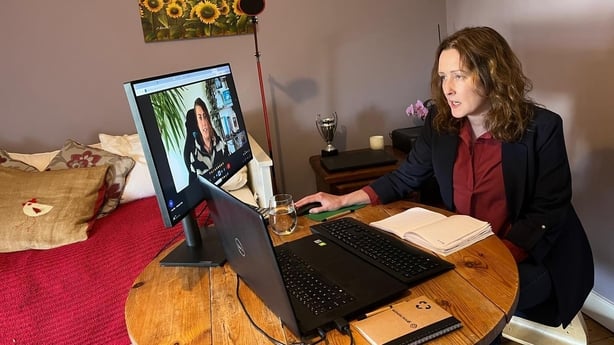This time five years ago the world of work was turned on its head.
As the first Covid lockdowns were announced, employees packed up equipment and headed for home leaving behind empty offices, businesses and classrooms.
The remote working revolution had begun.
It was a difficult transition for many, with no shortage of challenges such as slow broadband speeds and technical glitches, not to mention interruptions from family members and pets.
Five years on however, a working model that was borne out of a public health emergency has been embraced by thousands of employees who have no desire for things to go back to the way they were.
From publican to remote worker
Covid restrictions meant that Caitlín McConn was forced to close the pub she had been running in Roscommon town for the previous ten years.
She loved her job and said that a sense of shock was replaced by a grieving process when she realised that she was not going to reopen her pub.
"I closed on the 15 March 2020, expecting we'd go home for three weeks and everything would go back to normal but life took a huge change," Ms McConn said.
"It was quite a shock at the time.
"As time went on, I realised things would not be normal again and I think there was a grieving process almost for me when I made the decision that I was going to hand back the keys and not sign a new lease.
"The question for me then was, what am I going to do now?"

Ms McConn is now a fully remote worker operating out of her home office.
She is the Operations Manager with Grow Remote, an organisation that promotes remote working by offering training to businesses about how to transition away from in-office working to hybrid or fully remote.
"I get asked on a weekly basis if I miss the pub and there are elements that I do miss," Ms McConn said.
"I loved it for the ten years I did it but life is very different and I am much happier now."
When it comes to work-life balance, Ms McConn said she is certainly not looking back.
"Sorry to any of my old customers, I loved what I did when I did it, but life is so much more improved now," she said.
We need your consent to load this rte-player contentWe use rte-player to manage extra content that can set cookies on your device and collect data about your activity. Please review their details and accept them to load the content.Manage Preferences
Future of remote work
Despite some high profile return-to-office mandates at a number of companies, job flexibility remains an important part of recruiting talent in the current tight labour market where unemployment remains at record lows.
The proportion of job postings offering remote or hybrid work on hiring platforms such as Indeed and IrishJobs has remained stable at relatively high levels.
There have, however, been falls in the proportion of jobs offering fully remote opportunities.
Kevin Empey is International Head of Future of Work Strategy and Solutions with consultancy firm Lockton Ireland.
He believes that in recent years, flexibility, work-life balance and employee well-being have become core expectations rather than optional or exceptional perks.
"This trend was in play well before the pandemic, with employees looking for greater control over their time and working lives," Mr Empey said.
"While some employers may be keen to return to traditional models, ignoring these irreversible trends and demand for greater workplace flexibility could be costly."
"Companies that fail to offer some level of flexibility risk losing talent to competitors who embrace new ways of working," he added.
The push for employees to return to the office by some companies comes against a backdrop of rising costs for employers.

"Many organisations that introduced flexible work policies as a competitive advantage in a tight labour market are now questioning their sustainability in the longer term," he said.
"With rising employment costs, some employers are pushing back, seeking a more structured, traditional and controlled approach to workforce management."
Employment experts believe that a one-size-fits-all approach is simplistic and overall workforce productivity doesn't just come from employees being in an office.
"Employers who want to attract and retain top talent recognise that different workers have different needs and, depending on the work that needs to be done, more blended forms of work have clear productivity outcomes and advantages over traditional models," Mr Empey said.
Right to request remote work
Employees have a right to request remote or flexible working and for the last year they have been able to take a case to the Workplace Relations Commission (WRC) if they feel that request was not handled properly.
Critics of the process say it does not do enough to protect workers who wish to retain their flexible arrangements.
But it is important to note, there is no right to remote work in this country, rather a right to request it.

When the WRC hears one of these cases, it is essentially making sure that the correct procedures were followed by both the employee and employer when the application for remote working was made and subsequently refused.
Although the process has been operating for just over 12 months, the number of complaints that have been received remain relatively low and so far, no complainant has won their case.
Up to last week, the WRC had received 41 complaints.
Of these, 18 have been closed for the following reasons: seven complaints were rejected, two were resolved by mediation, eight were withdrawn before adjudication and one was withdrawn after.
The remaining 23 complaints are awaiting a hearing and/or decision by the WRC.
Remote work in the public sector
Return-to-office mandates are not just a feature of the private sector.
In the United States, Donald Trump and Elon Musk have demanded that government employees who are working remotely return to the office.
Here, a row erupted in January between the Fórsa trade union and the Department of Social Protection after it tried to increase the number of in-office days for remote working staff.
Fórsa had accused the department of acting unilaterally by trying to reduce the number of remote working days, without consulting with unions.
The union had instructed its members to continue working their current arrangements and warned that it was prepared to engage in a protective ballot for industrial action, should any members be threatened with disciplinary action for complying with the union instruction.
The department said it was disappointed by the approach being taken by Fórsa and insisted that it had shared its plans with unions.
It was a stark reminder of the importance of remote working to employees and a reminder that many are willing to fight to keep it.
Five years ago, the world was struck by a devastating pandemic that changed life as we knew it.
It was a terrible time that everyone will want to forget, but perhaps remote working is one of the few things from that era that people are keen to hold on to.







